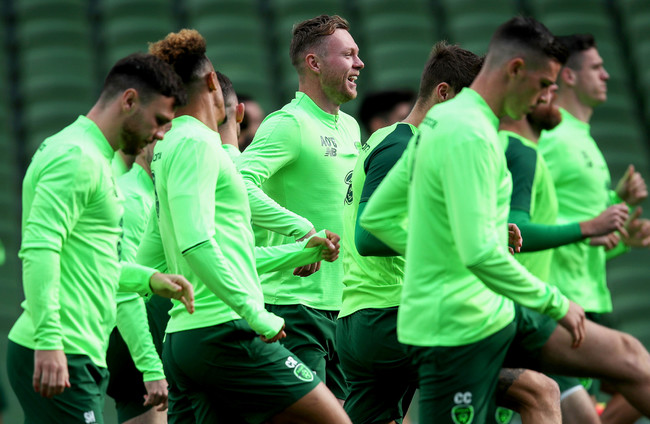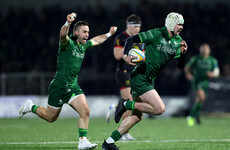Goalkeeper and defence
BARRING ANY INJURY mishaps, Middlesbrough’s Darren Randolph is a certainty to start in goal. Sean McDermott is uncapped and Colin Doyle isn’t playing regularly this season.
Shane Duffy is a dead cert to start too, and Ciaran Clark is also likely to keep his place in the side, despite more than one costly error in the recent 4-1 loss to Wales.
Martin O’Neill has hinted at opting for three at the back, and if he does go through with this system, it will be interesting to see who he goes with as the third-choice centre-back.
Barring a Kyle Walker-style decision to put a full-back in there, the options are Richard Keogh, Kevin Long, John Egan, Darragh Lenihan and Derrick Williams.
Of those names, Keogh and Long would be the obvious picks in terms of competitive experience, though Egan, Lenihan and Williams have all been in decent form in the Championship.
Martin O’Neill has a habit of throwing up the odd surprise selection — picking Robbie Brady as left-back for the Euro 2016 qualifier at home to Poland, handing Duffy a competitive debut against Italy at Euro 2016 and giving Kevin Long a competitive debut in the World Cup qualifier against Austria are a couple of examples.
Blackburn’s Williams has played just once for Ireland, though he was one of the better performers in the 2-0 friendly loss to France last May.
The 25-year-old Hamburg-born footballer is capable of playing both left-back and left-sided centre-back, so he seemingly would be a more natural fit in there than, for example, Keogh. Long is also a viable alternative, having played that role in the recent Poland friendly.
Wing-backs
James McClean is usually one of the first names on the team-sheet when fit, so expect Martin O’Neill to find a role for the 29-year-old regardless of the system they employ.
If it is a 3-5-2, which Ireland went with against Poland, then McClean will probably to revert to the left wing-back role, though O’Neill has played him as a second striker on occasion. The Stoke star’s pace and work-rate means he is unlikely to be a defensive liability, but there is a concern that the attacking threat he brings could be quelled if put in this relatively unfamiliar position.
Right wing-back is one of the more interesting selection dilemmas. With Seamus Coleman absent through injury, it is uncertain who O’Neill will pick. Matt Doherty is the in-form Irish player in the Premier League right now with Wolves, while Cyrus Christie is also playing in the top flight with Fulham, but has had a less impressive start to the season.
O’Neill has opted for Christie ahead of Doherty in the past, but the latter’s superb form could just swing the tight call in his favour.
Midfield
Jeff Hendrick, Conor Hourihane and Callum O’Dowda all started the game with Wales, though that was as part of a four-man midfield alongside Cyrus Christie.
Playing them as a three might give the side a better balance, with the onus on Hendrick and Hourihane in particular to put a shift in, while more will be expected creatively from O’Dowda.
Of the trio, however, arguably none are guaranteed to play, given that they have not been consistent starters at club level this season. The experienced likes of David Meyler and Harry Arter will feel they are not far off a starting spot either, while Shaun Williams caught the eye off the bench in Wales and started the subsequent match against Poland. Alan Browne, meanwhile, has been excelling at club level for some time now, and will hope to be given a chance.
Forwards
The pace and presence up front of Shane Long was badly missed against Wales. The Southampton striker missed training on Tuesday and Wednesday with an ankle knock, but provided he is fully fit, Long should start Saturday’s match.
The suspicion is that these games have come too soon for Sean Maguire, who only made his first appearance of the season in the final 15 minutes of Preston’s Championship clash with Wigan last weekend. Martin O’Neill suggested as much, when he hinted in a pre-match press conference that the ex-Cork City striker would likely play a cameo role at best in these games.
Callum Robibnson has more or less gone straight into the side after receiving international clearance to play, starting the matches against Wales and Poland. It also helps that the 23-year-old attacker has been showing decent form at Preston, with five goals already this season.
Aiden O’Brien did well on his debut in Wroclaw last month, scoring the header that put Ireland into the lead. If Long is deemed not fit enough to start, then the Millwall man is the most likely name to come into the side.
Predicted Ireland starting XI: Randolph; Clark, Duffy, Williams; Doherty, McClean; Hendrick, Hourihane, O’Dowda; Long, Robinson.

The42 is on Instagram! Tap the button below on your phone to follow us!











Here’s another anomaly in the whole hurling relegation/promotion structure. Winners of the Christy Ring Cup have to play the bottom team in the Joe McDonagh in a play-off. Seems the only place where there’s automatic relegation is in the Leinster group. Why not use the same system everywhere, so either there are playoffs, or there’s not?
Incidentally, and no offence intended to the late Joe McDonagh, but I can’t help wondering why his name was given to the new second tier competition, thereby elevating him above Christy Ring and Nicky Rackard. McDonagh was a great GAA man all right, but is he really worthy of a place higher than those other two in history?
I hope this victory helps to popularise the game of Hurling in Kildare
@Noel Martin: Well to be honest the last one in 2014 didn’t, the county board need to be the ones to stand up and take note. There’s plenty of interest in Kildare for Hurling, a lot of great work going in at underage level in clubs. It needs the backing from the county board, their attitude towards the game is desperate.